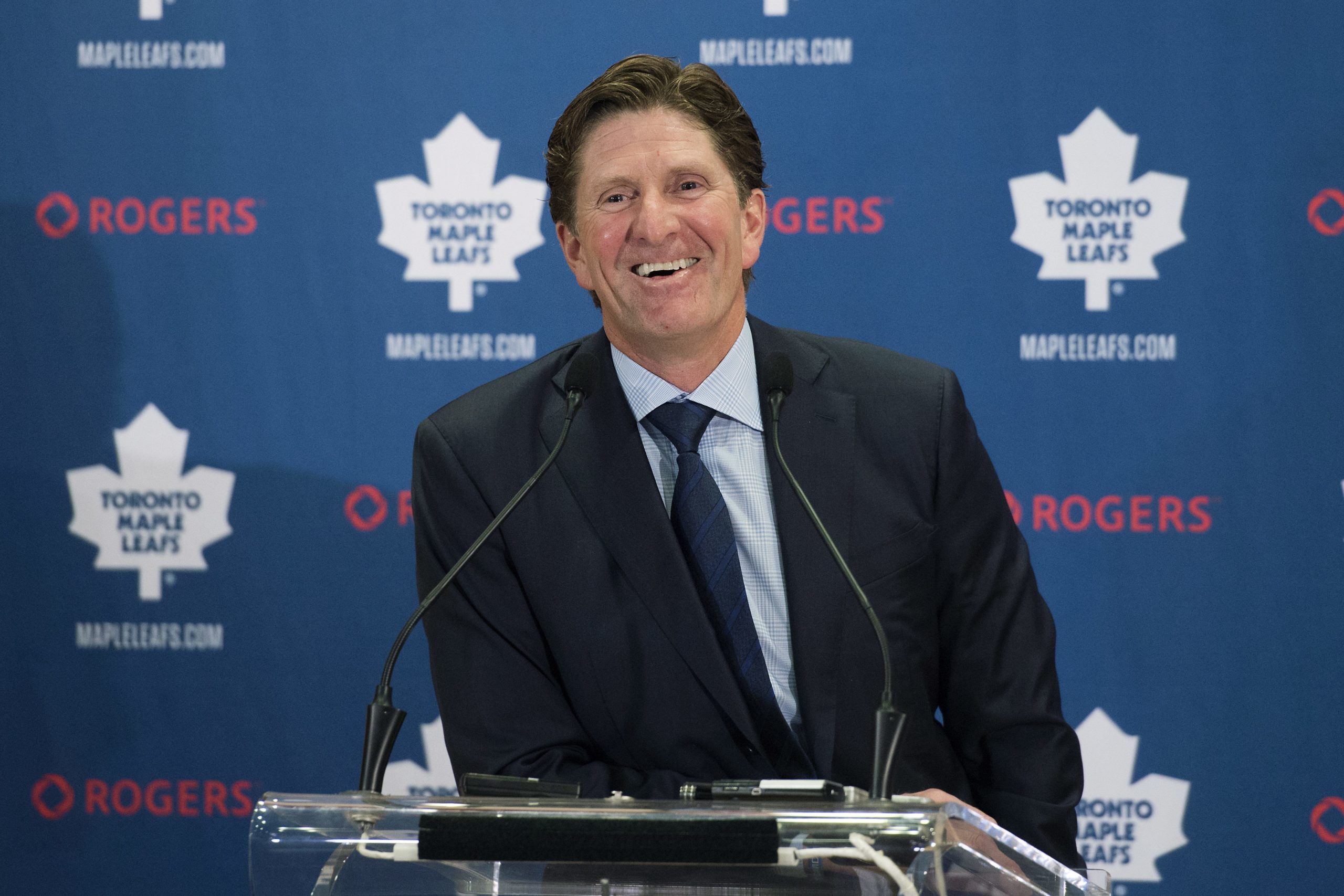Mike Babcock sat down with TSN’s Darren Dreger for an in-depth interview in advance of his first regular season game in Toronto.
For the full video, click here.
Dreger: The fan base will look at the year and will define success or failure based on wins or losses. Do you have the luxury of doing the same, or no?
Babcock: Well, I’m going to come in every day and try to win that game that night. But I also am going be big picture wise, understand where we’re going and what we’re trying to do. We just finished exhibition, we dropped our last five games in exhibition. Our best two games, in my opinion, by far, were our last two losses. I think we’re going in the right direction. You can say that in exhibition. It doesn’t hurt as bad. You get up in the morning and it didn’t count. They all count now. But, you know, I told this to people all the team – no one really believes but it’s the truth – I listen to country music for a reason. It’s because they don’t talk about hockey. I watch the hunting channel for a reason. They don’t talk about hockey. I’m going to work as hard as I possibly can to help the guys as much as I possibly can, expect to win, go home and love my wife and family, and come back and do it the next day.
Dreger: What are some of the things you saw from the group as the preseason progressed that are encouraging to you?
Babcock: We had the puck more in the past two games than we’ve had it forever. We cycled the puck in the offensive zone more than we’ve ever done. We were heavier on the puck, we got it back more. We had more people around the puck. We were way better defensively. What we did do every game, though, in exhibition with the exception of a few, is have what I would call a meltdown. Last game, for example, we got three guys in the neutral zone on the wrong side of the puck on a penalty kill that was a nothing play. We didn’t get it back. The good teams don’t do that. The great thing about hockey – when one guy makes a mistake, there’s someone else to insulate him. It’s always about the next play. So, what am I going to do the next play on offense? What am I going to do on the next play on defense? You’ve got to insulate one another. We’re getting better at that. We still make huge errors. The other thing about it is, when something goes wrong, it’s like the weight of the world comes over us. I could feel it on the bench the other night. They didn’t touch the puck, they got it, they scored, and it was like, “oh my God.” Just play.
Dreger: Is that history though?
Babcock: I think that’s overcoming where you’ve been. But that’s alright. We’re going to make our everyday matter. We’re going to get better everyday.
Dreger; You said in Detroit that this job, head coach of the Toronto Maple Leafs, is bigger than what you anticipated it would be. In what sense?
Babcock: The whole thing’s bigger. The Leafs are bigger than you could ever imagine unless you’re here. The city is greater. The fan base is greater than you can ever imagine. The way I think the job is bigger is some things are way better; the prospects are way better than I thought. Gardiner and Rielly are way better players than I thought. Kadri is a way better player than I thought. When you look at that, there is lots of things. The size of the job is we’ve got tonnes of work to do here. So, when you’ve been in one place as long as I have – and we averaged 106.4 points a year, that’s a lot of points over ten years – you’re used to things being done a certain way, with a certain standard. We’ve got lots of work to do. We’ve got a big job.
Dreger: When you arrived in Anaheim, you had a lot to work with, but you did a lot of work. That team was 26 points better and you marched to the Stanley Cup Finals. And then you’re first year in Detroit, 15 points better at the end of that year. When you look at the task, and you look at the group here – perhaps there are some changes along the way throughout the regular season – can you have as much impact in Toronto in year one as you had in Detroit and Anaheim?
Babcock: If you just measured it on points, I don’t know the answer to that, but we’re going to have a huge impact. So, that’s going to be individual development; that’s going to be the whole scheme of how we’re going to play; overall, our structure. The amount of work that’s taking place with Shanny and the group here since I arrived here – it’s incredible what’s been done. We’re on lap two. We’ve got tonnes more to go. I’ve loved my job. I said this to Kenny Holland the other day when him and I were talking. I said, “sometimes in the second period, when the other team didn’t let us touch the puck and we turned it over, I didn’t like it that much.” The last two games we dominated the second period. The good teams always eat up the other team in the second period. To me, that’s progress. I can’t answer your question. This is what I know we’re going to do: we’re going to get better each day, and however much time it takes, it takes. I’m confident in my ability. I’m confident in Lou’s ability, Shanny’s ability, Mark Hunter’s ability, Kyle Dubas’ ability. I’m getting more and more confidence every day in our group. We’re getting better. Let’s get going.
Dreger: I know you’re a teacher, but are you a button pusher? Maybe it’s part of being the same thing. You working every day to try to make each individual player better so that the team is better. For me, there is a bit of a difference. You can teach, but along the way, as you get to know some of these guys, you find out what buttons you can push to make them better.
Babcock: I misunderstood you. Obviously, when there’s 23 players on your team, you’ve got to have 23 different ways of coaching. There’s no question about it. You coach ‘em all different and they react different. I’m getting to know that right now. In training camp, when you arrive and you have 68 players and you get to 43, you don’t spend as much one on one time as you’re going to over the next couple of weeks. So, that’s going to be good growth for us. My individual meetings today were outstanding. I can tell when guys are starting to dig in. The one thing about it — when you’ve been doing it a long time, they can swoon you for a couple weeks, but not over time. You’ve seen it too many times. So, you know whether they’re in or not. We’ve got a lot of guys in.
Dreger: You haven’t come to any conclusion on any one player yet, whether he’s good, bad, or otherwise?
Babcock: Well, I’ve come to lots of conclusions, but what we’re going to do is we’re going to find out if my conclusions are right. In other words, in the short term, right now, they can trick you a little bit, but not over the long term. The NHL is too hard. It’s just too hard. It exposes you every night. The NHL exposes media people, coaches, players, trainers; it exposes us all. When you’re involved in the greatest League in the world, that’s what it does. We’re going to find out.
Dreger: There’s a belief that you chose Toronto over Buffalo as much for a life choice as a hockey choice. True or false?
Babcock: Well, I think there’s some fairness to that. It’s four and a half hours from Detroit, where my wife’s friends [are] and my kids want to go back. I’ve got a lake home there; I’ve got a beautiful property there. But Original Six, in the end, won out, without any question. Paul McLean always used to say, when something was really good, he’d say, “Babs, that’s NHL.” When something was great, he’d say, “Babs, that’s Original Six.” The franchise, the sweater, the city was the alluring factor in the end, and the challenge is immense. I like challenges.
Dreger: So what do you say to those who believe you’ve made the wrong choice from a hockey perspective?
Babcock: What I would say – I’m not evaluating what they have to say. Everyone is allowed to say whatever they want. Is that team ahead? They just drafted Jack Eichel. They probably have more players in the cupboard than we did originally. But I didn’t know who Connor Brown was. I didn’t know how good Nylander was. I didn’t know how good Zach Hyman was. I didn’t know how good Kapanen was. I didn’t know how good Valiev was, Dermott was, Nielsen was.
Dreger: And they’re better than what you thought?
Babcock: Oh, way better. They’re good players. And Rielly and Gardiner, they’re no slouches, those guys.
Dreger: This market can be hard on guys like that, right?
Babcock: I talked to the guys about that today. I told them what I told you. I listen to country music, and watch the hunting channel. I said, “no matter what I tell you, you’re going to read the media, and you’re going to follow because you want to know what they say about you. And your wife is going to do the same thing. I don’t know why you’d do that. I don’t know why you wouldn’t come to work, work as hard as you can, go home to your family and go on with your day.” I mean, I’m here to tell you Dregs that that’s not going to affect my life. I’m just going to do the best I possibly can and I’m going to enjoy being the coach of the Leafs.
Dreger: After the Buffalo game, you challenged your veteran group. Was that heat of the moment because you didn’t like how the team played?
Babcock: How do you protect your players, and how do you tell the truth? I’m going to protect them and look after them the best I can, but I’m telling the truth, too. If they don’t play hard enough, what I’m going to say – the next day one of the coaches said, “they’re all tweeting that you’re frustrated with the guys.” Frustration is a waste of energy. I didn’t think we played hard enough. Simple. I said, “We didn’t play hard enough.” Let’s get on with it. The second period, we took long shifts, turned the puck over, and cheated. I don’t know. When I don’t do my job, I hope my boss tells me. Real simple.
Dreger: You’ve used this term with me before – kitchen table accountability. For those that don’t know what that means, explain it.
Babcock: In that room, when you love one another, then you treat people with respect. You can demand more from them. You sit down at my kitchen table, if I say something stupid, one of my kids is calling me on it for sure. There is no room to hide. Those people that love you are allowed to call you on things. Once you build a relationship with these players, and a trust with these players, you’re allowed to make them better when they believe you’re in their court. Now, I’ve had lots of battles over the years with players. When I’ve had them, and they’re real upset with me, I know right away they don’t think I love them. Because, if they know you care about them and care about their family and care about them as people, they let you make them accountable.
Dreger: Who is your number one goalie?
Babcock: Bernier.
Dreger: You’ve already made that determination? Was their any doubt through preseason or training camp?
Babcock: Not for me.
Dreger: And until you tap them on the shoulder or have to tell them otherwise, he’s the number one goalie for the Maple Leafs?
Babcock: He’s starting on Wednesday and Friday, and Reims is starting on Saturday. Reims played real well in exhibition, trained all summer, did an excellent job. That’s his lot in life right now, and that’s Bern’s lot in life. I never talked about it until day. This is what I thought the whole time. I think it’s a good situation for the Leafs. We need to get Bernier back to being Bernier. He fit in good here on this team last year, how’s that? We need him to be the goalie he’s capable of being.
Dreger: Can he be a 60-game goalie?
Babcock: I think he should be 62.
Dreger: That’s just how you’d break down the year?
Babcock: That’s how I would.
Dreger: You mentioned Kenny Holland a few minutes ago. You have a great relationship with Kenny Holland. From a hockey perspective, you had a great relationship with Kenny Holland in Detroit. I wouldn’t call it unique, but you had a lot of influence and input. He made the final call on all the decisions. How does that change, or do you feel like you’ve got something similar with Lou Lamoriello in Toronto?
Babcock: Lou coming here was a homerun for me. I had Bryan Murray in Anaheim. What a man; taught me so much, is a good friend still today. Ken Holland taught me so much, good friend of my whole family, good man, we had so much success together. To me, what a program he has. It’s unbelievable. He made me better and I’m thrilled to be his friend, his family’s friend. Now I’ve got Lou Lamoriello, and what a guy and what a man. Great ideas. Great thinker. The image everyone has of Lou and what he is – oh man, what a difference. Likes to laugh, likes to enjoy himself. It’s been great to be around. Makes you better. He’s got great smarts. He tells me something each day I never thought of. It’s been excellent. I’m excited to have someone to talk to everyday. As a head coach, you need someone to talk to. I have Lou.
Dreger: Can you get him to return my text messages?
Babcock: Not likely.
Dreger: What do you look forward to most as we brace for the start of another NHL regular season?
Babcock: Well, I mean, obviously, it’s the best League in the world. I have chosen to come to a great, great city whose franchise doesn’t hold its rightful place in the NHL, in my opinion. We’re going to fix that over time. How soon can we do that, Dregs? I don’t know. I’m excited. I’m excited to coach some of these guys. I really am. I think there’s so much upside. We’ve just got to squeeze it out of them here and help them help themselves. In saying all that, are we going to have some tough nights? Absolutely. But, we’re going to have a sense of confidence that we’re going in the right direction. We’re just going to keep plugging away. Some days, it might not look like we know what we’re doing. It might look like that for a couple years. I’m pretty comfortable I know what I’m doing.


































